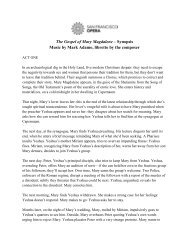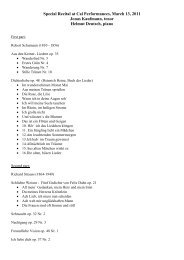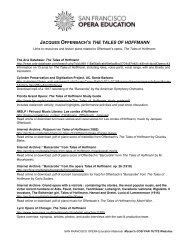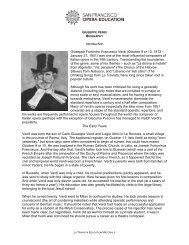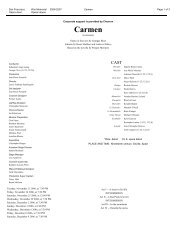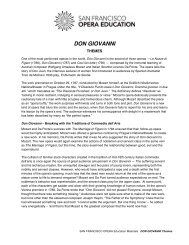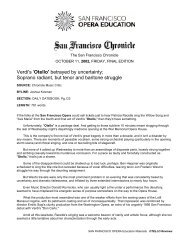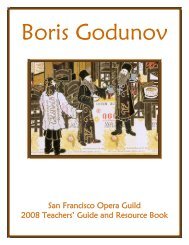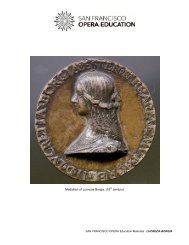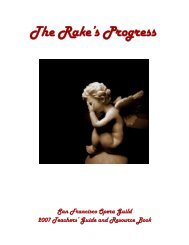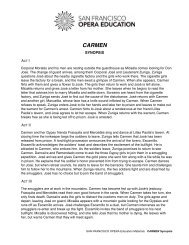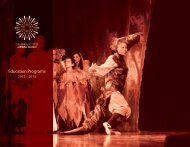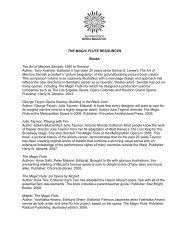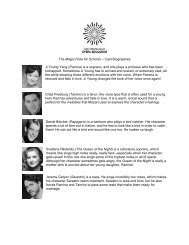You also want an ePaper? Increase the reach of your titles
YUMPU automatically turns print PDFs into web optimized ePapers that Google loves.
Librettist - The person who writes the libretto, often a poet or playwright.<br />
Maestro - Literally “master.” Used as a courtesy title for the conductor, whether a man or woman.<br />
Mark - To sing very softly or not at full voice. A full-length opera is very hard on a singer’s voice so<br />
most mark during rehearsals.<br />
Melody - The tune of a piece of music.<br />
<strong>Opera</strong> - A drama set with music. Different than a play or musical for the orchestra is an equal<br />
partner with the singers. Literally the word opera is the plural of the <strong>La</strong>tin word opus, which means<br />
“work.” Like a play, an opera is acted on a stage, with costumes, wigs, scenery, etc. Almost all of it<br />
is sung, in contrast to an operetta or musical, where a great deal of the text is spoken.<br />
<strong>Opera</strong> Buffa - A comic opera first developed in the eighteenth century. Each act usually ends with<br />
a large ensemble finale.<br />
Orchestra - The group of musicians who are led by the conductor and accompany the singers.<br />
Orchestra Pit - The sunken area in front of the stage where the orchestra plays.<br />
Overture - An orchestral piece several minutes in length played before the beginning of an opera.<br />
Usually, but not always, it contains some themes from the music of the opera.<br />
Patter Song - A song or aria in which the character sings as many words as possible in the<br />
shortest length of time.<br />
Piano - Literally “plane.” A dynamic marking meaning soft.<br />
Prelude - Usually short in duration and without an ending, a prelude leads into an act without<br />
pause, as opposed to an overture which is longer and can be played as a separate piece.<br />
Principal - A leading role or character in the opera.<br />
Prima Donna - Literally “first lady.” The leading woman singer in an opera. Because of the way<br />
some of them behaved in the past, it often refers to someone who is acting in a superior,<br />
demanding and difficult fashion.<br />
Production - The combination of sets, costumes, props, lights, etc.<br />
Prompt - To help a singer who has forgotten a line. In some opera houses, the prompter sits in a<br />
box at the very front of the stage. It is not customary for opera houses in America to use a<br />
prompter.<br />
Props (properties) - Small items carried or used by singers during a performance, such as fans,<br />
letters or a rope.<br />
Proscenium - The front opening of the stage which frames the action.<br />
Recitative - Sung dialogue that moves the action along by providing information. A recitative (or<br />
recit) usually has no recognizable melody and the singing is generally faster with a rhythm more like<br />
normal speech. Recitativo secco is accompanied only by a keyboard instrument such as a<br />
harpsichord, sometimes with added cello or bass.<br />
Roulade or Run - A quick succession of notes sung to one syllable.<br />
38



